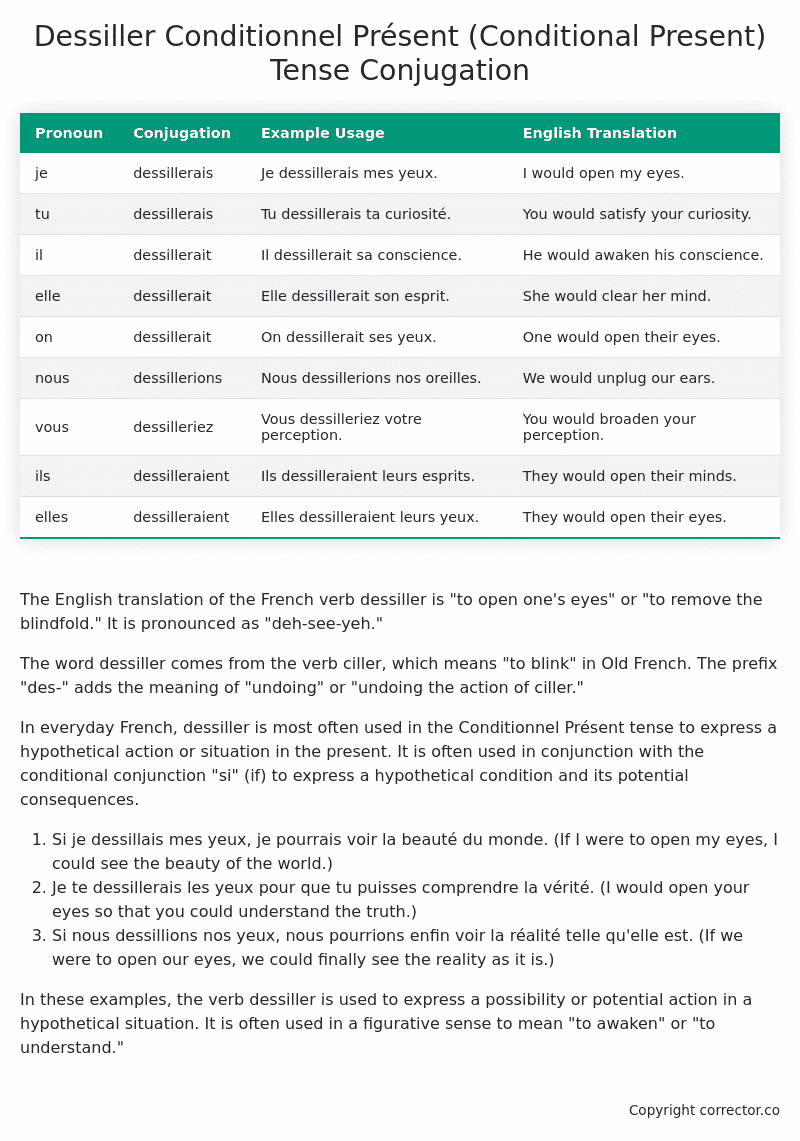Conditionnel Présent (Conditional Present) Tense Conjugation of the French Verb dessiller
Introduction to the verb dessiller
The English translation of the French verb dessiller is “to open one’s eyes” or “to remove the blindfold.” It is pronounced as “deh-see-yeh.”
The word dessiller comes from the verb ciller, which means “to blink” in Old French. The prefix “des-” adds the meaning of “undoing” or “undoing the action of ciller.”
In everyday French, dessiller is most often used in the Conditionnel Présent tense to express a hypothetical action or situation in the present. It is often used in conjunction with the conditional conjunction “si” (if) to express a hypothetical condition and its potential consequences.
- Si je dessillais mes yeux, je pourrais voir la beauté du monde. (If I were to open my eyes, I could see the beauty of the world.)
- Je te dessillerais les yeux pour que tu puisses comprendre la vérité. (I would open your eyes so that you could understand the truth.)
- Si nous dessillions nos yeux, nous pourrions enfin voir la réalité telle qu’elle est. (If we were to open our eyes, we could finally see the reality as it is.)
In these examples, the verb dessiller is used to express a possibility or potential action in a hypothetical situation. It is often used in a figurative sense to mean “to awaken” or “to understand.”
Table of the Conditionnel Présent (Conditional Present) Tense Conjugation of dessiller
| Pronoun | Conjugation | Example Usage | English Translation |
|---|---|---|---|
| je | dessillerais | Je dessillerais mes yeux. | I would open my eyes. |
| tu | dessillerais | Tu dessillerais ta curiosité. | You would satisfy your curiosity. |
| il | dessillerait | Il dessillerait sa conscience. | He would awaken his conscience. |
| elle | dessillerait | Elle dessillerait son esprit. | She would clear her mind. |
| on | dessillerait | On dessillerait ses yeux. | One would open their eyes. |
| nous | dessillerions | Nous dessillerions nos oreilles. | We would unplug our ears. |
| vous | dessilleriez | Vous dessilleriez votre perception. | You would broaden your perception. |
| ils | dessilleraient | Ils dessilleraient leurs esprits. | They would open their minds. |
| elles | dessilleraient | Elles dessilleraient leurs yeux. | They would open their eyes. |
Other Conjugations for Dessiller.
Le Present (Present Tense) Conjugation of the French Verb dessiller
Imparfait (Imperfect) Tense Conjugation of the French Verb dessiller
Passé Simple (Simple Past) Tense Conjugation of the French Verb dessiller
Passé Composé (Present Perfect) Tense Conjugation of the French Verb dessiller
Futur Simple (Simple Future) Tense Conjugation of the French Verb dessiller
Futur Proche (Near Future) Tense Conjugation of the French Verb dessiller
Plus-que-parfait (Pluperfect) Tense Conjugation of the French Verb dessiller
Passé Antérieur (Past Anterior) Tense Conjugation of the French Verb dessiller
Futur Antérieur (Future Anterior) Tense Conjugation of the French Verb dessiller
Subjonctif Présent (Subjunctive Present) Tense Conjugation of the French Verb dessiller
Subjonctif Passé (Subjunctive Past) Tense Conjugation of the French Verb dessiller
Subjonctif Imparfait (Subjunctive Imperfect) Tense Conjugation of the French Verb dessiller
Subjonctif Plus-que-parfait (Subjunctive Pluperfect) Tense Conjugation of the French Verb dessiller
Conditionnel Présent (Conditional Present) Tense Conjugation of the French Verb dessiller (this article)
Conditionnel Passé (Conditional Past) Tense Conjugation of the French Verb dessiller
L’impératif Présent (Imperative Present) Tense Conjugation of the French Verb dessiller
L’infinitif Présent (Infinitive Present) Tense Conjugation of the French Verb dessiller
Struggling with French verbs or the language in general? Why not use our free French Grammar Checker – no registration required!
Get a FREE Download Study Sheet of this Conjugation 🔥
Simply right click the image below, click “save image” and get your free reference for the dessiller Conditionnel Présent tense conjugation!

Dessiller – About the French Conditionnel Présent (Conditional Present) Tense
Formation
Common Everyday Usage Patterns
Expressing Polite Requests
Expressing Hypothetical Situations
Expressing Doubt or Uncertainty
Interactions with Other Tenses
Present Tense
Past Tense
Future Tense
Conditional Perfect
Summary
Want More?
I hope you enjoyed this article on the verb dessiller. Still in a learning mood? Check out another TOTALLY random French verb conjugation!


